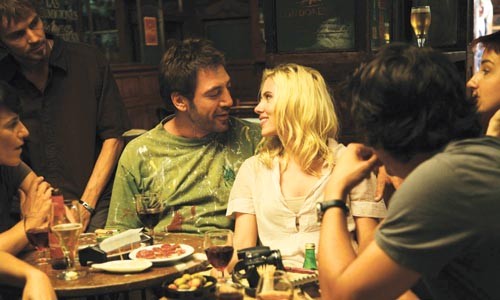Woody Allen has never made a better movie than his 1977 Oscar-winner, Annie Hall, and it seems pretty certain now that he never will.
Annie Hall was an ambidextrous mix of comedy, drama, pathos, romance, intelligence, wisdom and originality: It begins as a standup-comedy routine, then moves elegantly back and forth between past and present, real and imagined. How can cartoon characters pop up in a live-action movie to talk about menstruation and not seem to be ridiculous and contrived? Just watch Annie Hall and you'll know.
Early in the movie, in a brief sequence at a bygone Coney Island, Allen's character and narrator, Alvy Singer, admits that he's always had a hard time distinguishing fantasy from reality. As he says this, a voluptuous floozy with red lipstick approaches the camera and throws us a kiss. It's a splendid conceit that pokes a tiny little hole in the cinematic proscenium without actually breaking it.
But when Allen's private dramas spilled over into his public life -- that is, when he began to take nude photographs of his then-lover's teen-age adopted daughter, who's now his wife -- it became, for me, impossible to see his movies with the same innocence and pleasure. I'm not sure why that is: I don't feel that way about the films of Roman Polanski. But that's the lens through which I now can't help reading Allen, and it obscures his work uncomfortably, making it all a little creepy.
In Vicky Cristina Barcelona, Allen constructs another of his sexual fantasies in the guise of a realistic romantic drama. It's the story of a love triangle -- actually, a love pentagon -- that revolves around two women and the man they desire, each to a different degree.
Vicky (Rebecca Hall), the sensible one, is in Barcelona for the summer working on her master's thesis about "Catalan identity." She's engaged to the devoted Doug (Chris Messina), a handsome young businessman who is back home in America. Vicky's BFF, Cristina (Scarlet Johansson), has just starred in and directed a 12-minute film, and she takes photographs, although she has no idea where her artistic passions will lead her. She joins Vicky for the summer in Spain, where they reside at the home of Vicky's wealthy relative. (These people are all Allen's New York intellectual crowd gone transatlantic, just as Allen and Polanski have.)
Then, at a gallery, they spy -- and are spied by -- Juan Antonio (Javier Bardem), a dreamy painter who invites them both to join him on a private plane flight to an idyllic resort, where they can look at art and all make love together. Vicky says no and no and no, but Cristina falls for him because he's "creative and artistic," even though, for all she knows, his art consists of shit thrown on a canvas, and then shellacked.
Stepping outside of herself for a moment, a vaporous Vicky sleeps briefly with Juan Antonio. But it's Cristina who lands him, and they move in together. Then, Maria Elena (Penelope Cruz), Juan Antonio's tempestuous ex-wife, comes to live with them after a suicide attempt. At first Cristina withers, but then she and Maria Elena bond, after which they "bond." And then Juan Antonio joins the two of them in "bonding." And so on, until the lively Spanish ballad about Barcelona that we heard over the opening titles returns for a fade to black.
Vicky Cristina Barcelona is aggressively photographed in an orange glow, and here and there Allen films a provocative scene that might have been part of an authentic movie. But most of his work is a lazy exegesis about the difficulty -- no, impossibility -- of having it all in the arena of love, so we settle for what we can get, which is often a lot. ("We need the eggs" -- Alvy Singer.) Allen is somewhat subtle here with his hidden agenda, although you can't help but cringe at the autobiographical undertow when Cristina says she doesn't want to run her life "by what's appropriate to the Appropriate Police."
In Annie Hall, we watched love blossom and wilt between its characters. In Vicky Cristina, an omniscient narrator, like the kind you find in a Victorian novel, lays out every emotion and theme, and then the characters repeat them. The Spanish phrase for the type of painting that English calls a "still life" is naturaleza muerto, which literally means "dead nature." It's the best way I can think of to describe Allen's lifeless demi-creations.
Of course, it's possible that Allen meant this all to be the driest comedy of his career. It does have some of the romantic loopiness of his enjoyable A Midsummer Night's Sex Comedy, and people in the audience I saw it with laughed a few times. How can you not laugh at Juan Antonio's father, a white-haired "poet" who's never published his work because he wants to deny obtuse people the beauty of his words. Whatever, gramps. I only wonder how he could afford that gorgeous country home.
The two leading American ladies in Vicki Cristina are a bit lightweight but not ruinous. Cruz is invigorating, especially in her native Spanish; Bardem provides the most nuanced performance, and he's Allen's alter ago, so naturally his character is thoroughly redeemed. These actors all try to give Allen's essay some integrity. But when Cristina calls herself "free-thinking," then sits up naked in bed and covers her bare breasts with a blanket, all I could see was a dishonest filmmaker trying to get a PG-13 rating. In English, and some Spanish, with subtitles.
















